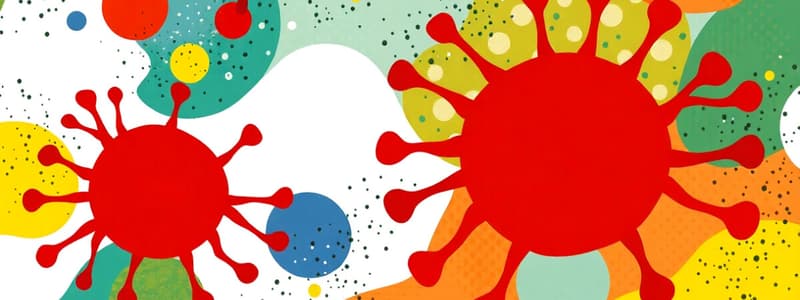Podcast
Questions and Answers
Which of the following is NOT a characteristic of a T-cell dependent antigen?
Which of the following is NOT a characteristic of a T-cell dependent antigen?
- Requires T cell help for B cell activation
- Usually consists of proteins
- Induces only IgM antibody production (correct)
- Can lead to immunological memory
Superantigens are unique because they:
Superantigens are unique because they:
- Stimulate only a small number of T cells
- Cause a delayed hypersensitivity reaction
- Bind to the TCR and MHC outside of the peptide-binding groove (correct)
- Are taken up and processed by antigen presenting cells
What is the primary difference between BCR and TCR recognition of antigens?
What is the primary difference between BCR and TCR recognition of antigens?
- BCRs recognize soluble antigens, while TCRs recognize only cell-bound antigens
- BCRs recognize epitopes on carbohydrates and proteins, while TCRs recognize only peptides
- BCRs require antigen processing and presentation, while TCRs do not
- BCRs do not require antigen processing or presentation, while TCRs do (correct)
Which of the following is an example of a T-cell independent antigen?
Which of the following is an example of a T-cell independent antigen?
A patient presents with a severe systemic inflammatory response, including fever, rash, and hypotension. Which type of immune response is most likely involved?
A patient presents with a severe systemic inflammatory response, including fever, rash, and hypotension. Which type of immune response is most likely involved?
What is the function of MHC molecules?
What is the function of MHC molecules?
Which of the following statements about T-cell independent antigens is FALSE?
Which of the following statements about T-cell independent antigens is FALSE?
What distinguishes immunogens from antigens?
What distinguishes immunogens from antigens?
What is an epitope?
What is an epitope?
Which of the following characteristics contributes to immunogenicity?
Which of the following characteristics contributes to immunogenicity?
Which of the following statements about haptens is true?
Which of the following statements about haptens is true?
Which type of antigen has more than one epitope?
Which type of antigen has more than one epitope?
Why are proteins considered good immunogens?
Why are proteins considered good immunogens?
What happens if an antigen has a molecular weight less than 10,000 Dalton?
What happens if an antigen has a molecular weight less than 10,000 Dalton?
Which type of molecule is least likely to be a good immunogen?
Which type of molecule is least likely to be a good immunogen?
Flashcards
Antigen (Ag)
Antigen (Ag)
Any substance that can be recognized by the immune system and react with specific antibodies and receptors on B and T lymphocytes (BCR & TCR).
Immunogen
Immunogen
A substance that can stimulate the immune system to produce specific cellular and antibody responses.
Epitope (Antigenic Determinant)
Epitope (Antigenic Determinant)
The specific part of an antigen that is recognized by the immune system (B & T cells receptors).
Monovalent Antigen
Monovalent Antigen
Signup and view all the flashcards
Polyvalent Antigen
Polyvalent Antigen
Signup and view all the flashcards
Hapten
Hapten
Signup and view all the flashcards
Immunogenicity
Immunogenicity
Signup and view all the flashcards
Foreignness
Foreignness
Signup and view all the flashcards
Epitopes
Epitopes
Signup and view all the flashcards
T-cell Independent Antigens
T-cell Independent Antigens
Signup and view all the flashcards
T-cell Dependent Antigens
T-cell Dependent Antigens
Signup and view all the flashcards
Superantigens
Superantigens
Signup and view all the flashcards
Major Histocompatibility Complex (MHC)
Major Histocompatibility Complex (MHC)
Signup and view all the flashcards
Free Soluble Epitopes
Free Soluble Epitopes
Signup and view all the flashcards
Intracellular Epitopes
Intracellular Epitopes
Signup and view all the flashcards
Study Notes
Antigens, Immunogens, Epitopes & Haptens
- An antigen (Ag) is any substance recognized by the immune system and reacts with specific antibodies and receptors on B and T lymphocytes (BCR & TCR).
- An immunogen is a substance that is recognized by the immune system and stimulates it to produce specific cellular and antibody responses. All immunogens are antigens, but not all antigens are immunogens.
- Examples of immunogens include human chromosome injection into a lab animal, which can produce anti-DNA and anti-histone antibodies.
Epitopes
- Epitopes (antigenic determinants) are the parts of an antigen recognized by the immune system (B and T cell receptors).
- They are considered the basic recognition units of antigens.
- Epitopes have a three-dimensional structure that complements antibodies, BCRs, and TCRs.
- An antigen with one epitope is called a monovalent antigen.
- An antigen with more than one epitope is called a polyvalent antigen.
Haptens
- Haptens are small, non-biological molecules that typically cannot stimulate a specific immune response on their own.
- However, when conjugated with larger molecules (carriers), they can trigger an immune response, specifically antibody production.
- Examples include penicillin, which can bind to red blood cells (RBCs), leading to hemolysis and allergic reactions. Formaldehyde reacting with skin proteins can also cause allergic reactions.
Immunogenicity and Properties of Immunogens
- Immunogenicity is the ability of an immunogen to induce a specific immune response.
- Key properties of immunogens include:
- Foreignness: The immune system distinguishes between foreign (non-self) and self substances. Immune cells typically do not react with self antigens because of tolerance.
- Size: A molecular weight less than 10,000 Daltons (10 kDa) generally results in a poor immunogen. Larger molecular weight antigens tend to be more immunogenic.
- Chemical nature: Proteins are stronger immunogens than carbohydrates, which are better than steroids, nucleic acids, and lipids.
- Complexity: More complex chemical structures generally lead to stronger immunogenicity. Heteropolymers (structures with different amino acid sequences) are generally strong immunogens.
Epitope Recognition
- B-cell receptors (BCRs) recognize free, soluble, and extracellular antigens, with multiple, repeated external epitopes to cross-link BCRs. Carbohydrates and proteins with epitopes interact with BCRs.
- T-cell receptors (TCRs) recognize intracellular antigens. Internal epitopes need degradation before presentation to stimulate T cells integrated with MHC.
Professional Antigen-Presenting Cells (APCs)
- Professional APCs include dendritic cells, macrophages, and B cells.
- These cells process and present antigens to T cells to trigger an immune response.
Antigen Presentation
- Phagocytes ingest foreign substances (bacteria) and present antigen parts on their surface.
- Helper T cells are activated.
Superantigens
- Superantigens are proteins produced by some pathogens.
- Unlike typical antigens, they are not processed by phagocytes.
- They directly cross-link the outside groove of MHC with the TCR of T cells, leading to massive T-cell activation and release of large quantities of cytokines.
- This results in a hyper-immune response causing fever, systemic problems, skin rashes, hypotension, and shock.
- Examples include bacterial exotoxins from Staphylococcus aureus.
T-Cell Dependent and T-Cell Independent Antigens
- Antigens can be classified as either T-cell dependent or T-cell independent.
- T-cell dependent antigens require T-cell help for B-cell activation (examples include proteins).
- T-cell independent antigens directly activate B cells (examples include polysaccharides or LPS).
Major Histocompatibility Complex (MHC)
- MHC molecules are glycoproteins found on the surface of all nucleated body cells.
- They are encoded by MHC genes located on chromosome 6 and are responsible for presenting antigens for recognition by T cells.
- Each person has unique MHC characteristics, except identical twins.
- MHC has three main functions: antigen presentation, playing a role in transplant rejection, and involvement in autoimmune diseases.
Classification of MHC Molecules
- MHC class I molecules are present on all nucleated cells except RBCs. They present antigens to cytotoxic T cells (CD8). MHC class II molecules are present on antigen-presenting cells like macrophages, dendritic cells, and B cells. They present antigens to helper T cells (CD4).
Studying That Suits You
Use AI to generate personalized quizzes and flashcards to suit your learning preferences.
Related Documents
Description
This quiz covers key concepts in immunology, focusing on antigens, immunogens, epitopes, and haptens. Understand the distinctions between these terms and their roles in the immune response. Test your knowledge on how these components interact with the immune system.





